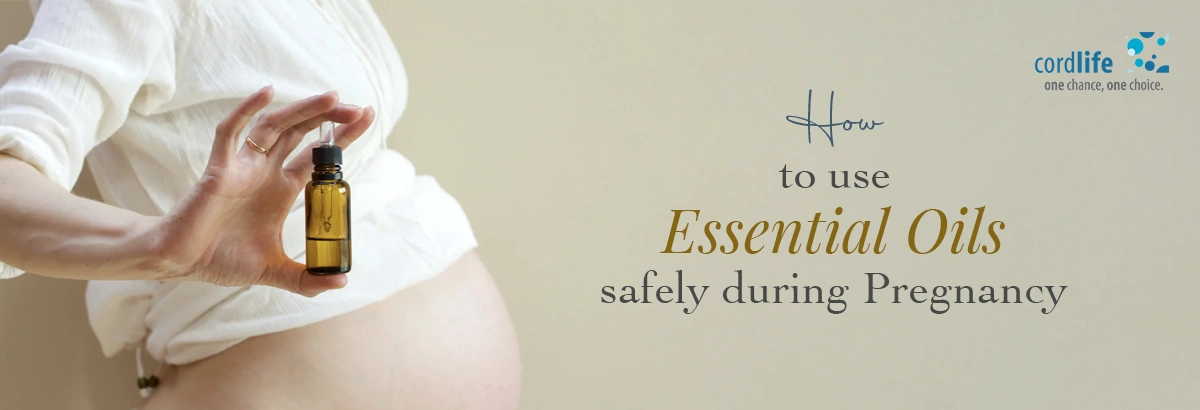Table of Contents
- Benefits of Essential Oils While Pregnant:
- Safety of Essential Oils While Pregnant
- Guidelines for Using Essential Oils During Pregnancy
- Do not Consume Essential Oils
- Dilution is Crucial
- Safe Essential Oils for Moms-to-be
- How to Use Essential Oils in Pregnancy
- Essential Oils to Avoid During Pregnancy
- Bottom Line
When you are dealing with pregnancy, you may feel bombarded with a dozen don’ts from all directions.. Be it food or drinks, you are going to be a bit finicky at times, whether you should try this or that. For example, some moms-to-be hesitate to eat certain types of fish due to the fear of mercury. But incorporating healthy fish into the diet is generally advisable. Similarly, the myth around the consumption of certain fruits confuses many moms-to-be.
The same applies to the use of oils during pregnancy. Understandably, the search for pregnancy-safe essential oils is justified. This concern simply stems from the worry about using essential oils during pregnancy. But does it make sense? Let’s break down the important details to make an informed decision.
Benefits of Essential Oils While Pregnant:
Contrary to popular notion, there’s no wholesome ban on the use of essential oils. Instead, certain oils can be effective in providing therapeutic benefits that can reduce numerous pregnancy complications.
Let’s explore some benefits of essential oils in pregnancy. Here’s how they can help:
- assist in lessening nausea and stomach upset
- relax sore muscles
- help reduce irritation and slow the inflammatory process associated with haemorrhoids
- improve sleep quality
- enhance skin elasticity
- reduce the appearance of stretch marks
- help reduce anxiety during labour
Safety of Essential Oils While Pregnant
As opposed to the common concern surrounding essential oils that they can metabolise into toxic compounds, experts state that they are generally safe as long as the oils are used in the right dosages.
All you need to do is stick to the recommended amounts and follow the guidelines. Consult your doctor to address your questions and concerns.
Guidelines for Using Essential Oils During Pregnancy
Most importantly, do not use essential oils in your first trimester. The first trimester is the most vulnerable time of pregnancy, so the developing embryo mustn’t be exposed to any kind of toxic substance.
However, if you are in your second or third trimester, make sure to observe the safety measures below while using accepted essential oils.
Do not Consume Essential Oils
Essential oils are not a food, and they should not be taken by mouth even if you are not pregnant, unless a doctor or a specialist is directly supervising it. A number of essential oils may affect moms-to-be and their baby if they are taken internally without guidance.
Focus on Aromatherapy
Many expectant moms are wondering if they can use alternative treatments like Aromatherapy during pregnancy. Essential oils are very accessible for women to use without any instruction or knowledge of the potential hazards and advantages. Central to the notion of many reports is that aromatherapy is a safer choice for a pregnant person as opposed to topical applications. That means simply using your essential oils in a diffuser rather than applying them to your skin.
Dilution is Crucial
Whether you are pregnant or not, if you decide to use oils on your skin, then you will need a carrier oil, as it is known, to do it safely. The reason is that essential oils are highly concentrated and can cause irritation of the skin if applied directly without dilution.
Safe Essential Oils for Moms-to-be
Given the myths and misconceptions about potential dos and don’ts, many wonder what might be safe essential oils for moms-to-be.
While some essential oils may not be harmful during pregnancy, the safety of these products might depend on the different trimesters and the way of used. For instance, the use of a few oils is only allowed during the second and third trimesters. Seeking a doctor’s advice before using essential oils during pregnancy is a must.
Here’s a list of some safe essential oils during pregnancy.
- Cardamom
- Ginger
- Eucalyptus
- Frankincense
- Grapefruit
- German or Roman Chamomile
- Lavender
- Mandarin
How to Use Essential Oils in Pregnancy
Always confirm with your doctor before using essential oils during pregnancy. Here are some safety guidelines on the usage of essential oils for expectant mothers.
- Don’t ingest them
- Don’t apply them directly to your skin
- Diffuse the oil or smell it from a tissue to enjoy the aroma
- Mix it with a carrier oil like coconut or jojoba if you are to apply it to your skin
- Perform a patch test in a small area of your skin
- Keep your mixture mild
- Using approximately 1% to 1.5% concentration is generally considered safe.
Essential Oils to Avoid During Pregnancy
Not all oils are benign for the body during pregnancy. Some oils should be avoided altogether, especially those that cause uterine contractions or stimulate the uterus. Let’s avoid the following oils during pregnancy:
- Anise
- Basil
- Camphor
- Cinnamon
- Clove
- Hyssop
- Mugwort
- Nutmeg
- Pennyroyal
- Rosemary
- Sage
- Wintergreen
Bottom Line
Essential oils can provide a lot of benefits during pregnancy; however, we have to keep in mind that some types of oils and ways of application need to be treated with caution or even be avoided. In other words, seeking medical advice from a health professional to ensure safety is always advisable while using essential oils.

